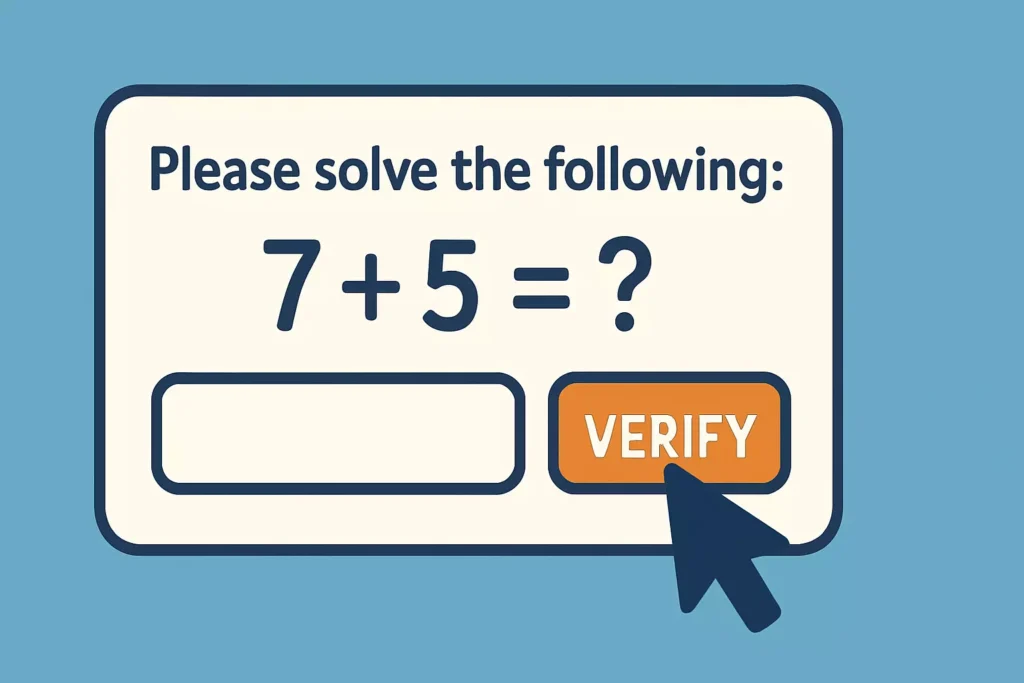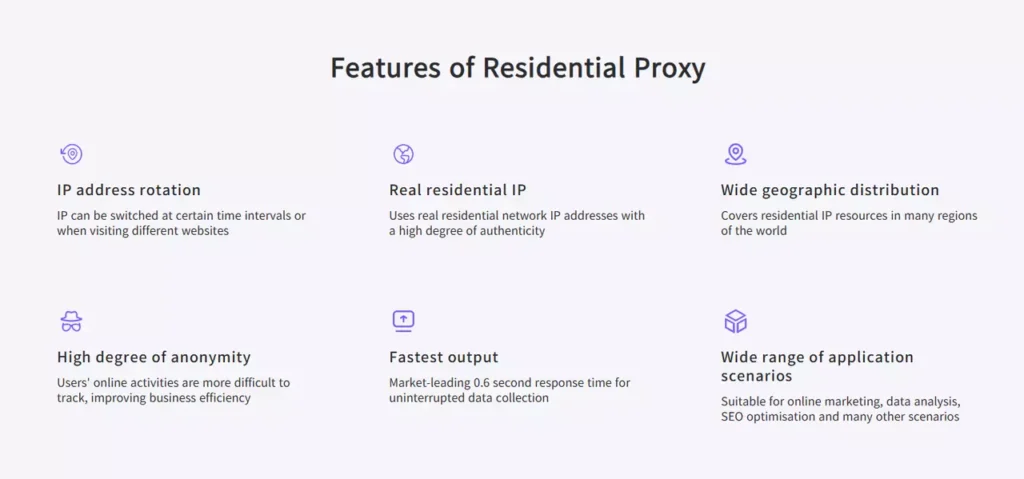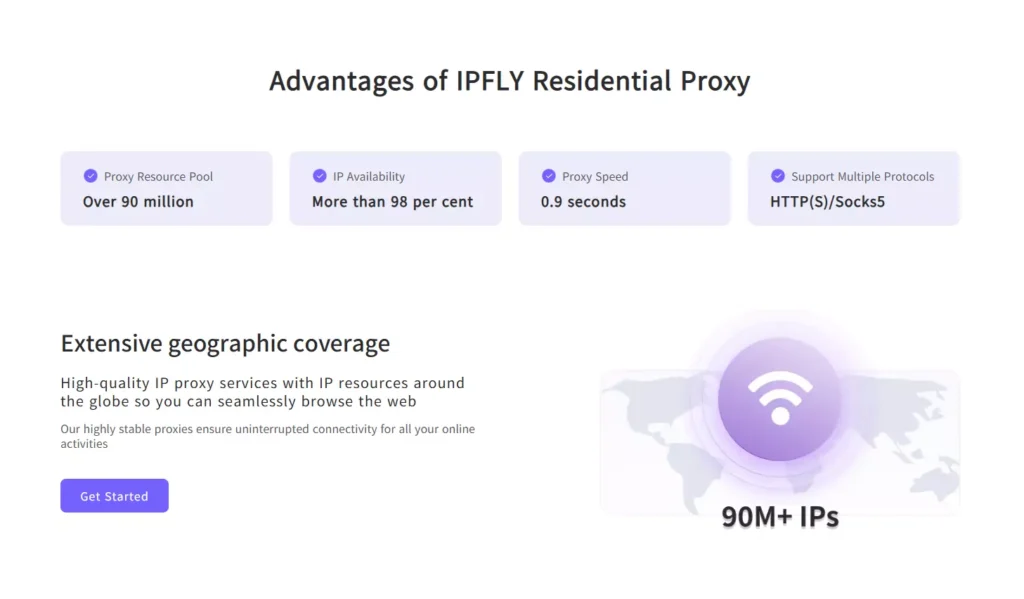We’ve all encountered those little tests on websites that ask us to solve a problem or click images to prove we’re human. Among them, mathematical CAPTCHAs are one of the most straightforward, but why do we see them, and what role do they play in today’s online environment?
This guide unpacks what a mathematical CAPTCHA is, how it helps distinguish real users from bots, and why it often shows up in connection with proxy usage. We’ll also explore how proxies, such as residential or datacenter IPs, can affect your experience with CAPTCHA challenges.

What Is a CAPTCHA?
A CAPTCHA (Completely Automated Public Turing test to tell Computers and Humans Apart) is a tool used to protect websites from automated scripts. It presents challenges that are easy for humans to complete but difficult for bots to solve.
Common types of CAPTCHA include:
- Text-based: Typing distorted characters from an image.
- Visual: Identifying images with specific elements, such as traffic lights or bicycles.
- Mathematical: Solving a simple arithmetic problem.
- Audio: Listening to a string of letters or numbers and typing them.
- Behavioral or Invisible: Detecting human-like patterns such as mouse movement or timing, often without visible input.
What Are Mathematical CAPTCHAs?
Mathematical CAPTCHAs present users with a simple arithmetic question, like:
- “What is 7 + 2?”
- “Solve: 10 – 4 = ?”
These are designed to block bots while remaining accessible and easy for real users, especially those on mobile devices or with visual impairments.
Advantages include:
- Quick to complete
- Low visual strain
- Effective when paired with other bot detection tools
Why Are CAPTCHAs Necessary?
CAPTCHAs act as a frontline defense against a wide range of online threats:
- Spam submissions in comments or forms
- Automated account creation
- Brute-force login attempts
- Data scraping from websites
- Fake transactions or checkout abuse
Mathematical CAPTCHAs, in particular, provide a lightweight method to ensure human presence without overloading the user.
How Proxies Affect CAPTCHA Frequency

When users connect through a proxy—especially one with a shared or datacenter IP—they are more likely to encounter CAPTCHAs. This is because proxy IPs are often flagged by websites for behavior that appears automated or suspicious.
Some common proxy-related triggers include:
- Fast, repetitive form submissions
- IP addresses associated with previous bot activity
- IPs from subnets known for automation use
Residential proxies, like those offered by IPFLY, tend to perform better in these scenarios. These proxies mimic real user traffic by routing through actual residential ISPs, reducing the likelihood of being flagged by CAPTCHA systems.
CAPTCHA and Proxy Detection: How They Work Together
Websites today use multi-layered detection strategies combining:
- CAPTCHA systems
- IP reputation scoring
- Browser fingerprinting
- Behavioral analysis
If a system detects an IP address with abnormal patterns—such as solving CAPTCHAs too fast or originating from suspicious ranges—it may trigger a CAPTCHA or escalate the challenge level.
In many cases, a math CAPTCHA is used as the first check. If a user passes but still shows questionable behavior, more advanced CAPTCHAs (like image recognition) may follow.
Minimizing CAPTCHA Triggers: What You Can Do
If you’re frequently running into CAPTCHA screens, especially during automation or data collection tasks, there are a few strategies to reduce the friction:
- Avoid public or free proxies with poor IP reputations.
- Use rotating residential proxies from reputable providers like IPFLY.
- Limit aggressive browsing behaviors such as excessive form requests or instant interactions.
- Configure browser headers and fingerprinting settings to appear more human-like.
IPFLY’s proxy services offer options specifically tailored for web scraping, ad verification, social media management, and other high-frequency tasks. The use of clean IP pools and IP rotation logic helps minimize unwanted CAPTCHA interruptions.
Examples of CAPTCHA in Use
Here are a few CAPTCHA examples you may recognize:
- Text: “Type the characters you see: 9HD73”
- Visual: “Click all images with buses.”
- Math: “What is 4 + 5?”
- Checkbox: “I am not a robot.”
Each type is calibrated to measure specific human behaviors. Sites often adjust the challenge type based on the user’s connection source, including proxy detection results.
Can CAPTCHA Be Bypassed?
Some users try to bypass CAPTCHA tests by tweaking headers or automating browser actions. However, doing so often violates a site’s terms of service and can result in being blocked or banned.
Rather than bypassing CAPTCHAs, a better long-term strategy is to use high-quality proxies that reduce the need for CAPTCHA altogether. For example, IPFLY’s residential proxy network is designed to mimic typical browsing patterns, lowering the chance of triggering security challenges.
Final Thoughts

Mathematical CAPTCHAs may seem simple, but they play a key role in online security—especially when working alongside sophisticated bot detection tools. When combined with IP analysis and behavioral monitoring, they form a reliable layer of defense against automation abuse.
If your workflows involve automation, scraping, or managing multiple accounts, understanding the relationship between proxies and CAPTCHA is essential. Choosing the right proxy solution—like rotating residential proxies from IPFLY—can significantly reduce interruptions, letting your tasks run smoothly without constant human verification challenges.
FAQ
What’s a CAPTCHA? A security test used by websites to distinguish humans from bots.
What is a mathematical CAPTCHA? A CAPTCHA that asks users to solve a basic math problem, like 5 + 2.
Why do I see CAPTCHAs often when using proxies? Public or datacenter proxies often have flagged IPs, leading to more CAPTCHA triggers.
How can I reduce CAPTCHA frequency? Switch to clean, rotating residential proxies and avoid suspicious browsing behavior.
Do all proxies trigger CAPTCHAs? No. Well-maintained proxy networks like IPFLY’s residential proxies are far less likely to be flagged.


